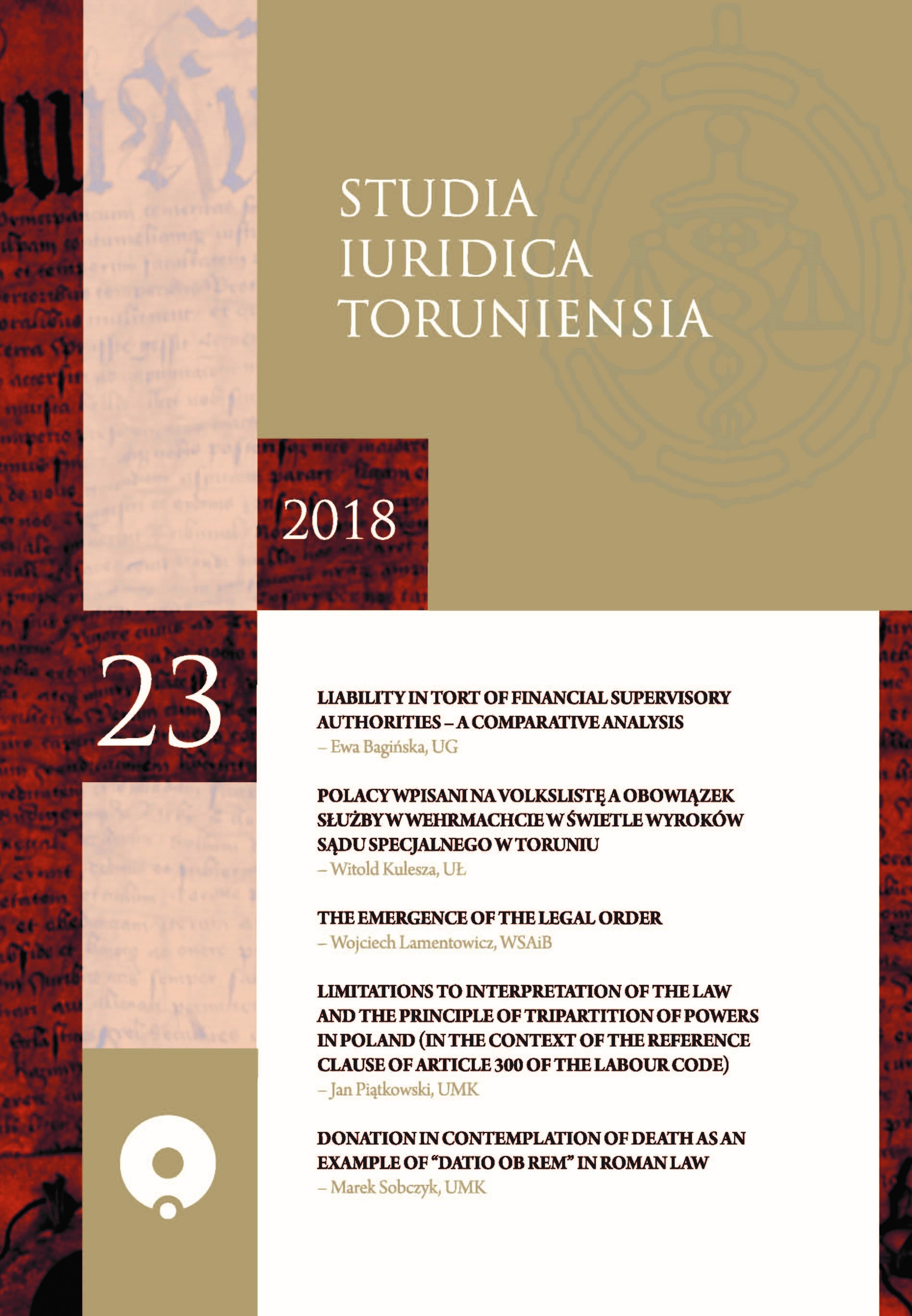Donation in contemplation of death as an example of datio ob rem in Roman law
DOI:
https://doi.org/10.12775/SIT.2018.040Keywords
donation in contemplation of death, datio ob rem, condictio causa data causa non secutaAbstract
Donation in contemplation of death was one of the basic examples of datio ob rem which is an essential element of condictio causa data causa non secuta, which is the Roman root of the contemporary concept of performance rendered for an intended purpose that has not been achieved within the meaning of art. 410 § 2 of the Polish civil code of 1964. In this article the legal nature of this donation and various forms of its application are described. Particular attention is paid to the purpose of the donor’s performance in relation to the general idea of “giving on purpose” (datio ob rem) in Roman law. Moreover, the evolution of donatio mortis causa towards its assimilation with the institution of Roman inheritance law, especially legacies, is shown.
References
Amelotti M., La “donatio mortis causa” in diritto romano, Milano 1953.
Ankum H., Donations in contemplation of death between husband and wife in classical Roman law, “Index” 1994, no 22.
Archi G.G., Donazione, ED, vol. 13, Milano 1964.
Berger A., Encyclopedic Dictionary of Roman Law, Philadelphia 1953.
Biondi B., Successione testamentaria e donazioni, Milano 1955.
Chaudet F., Condictio causa data causa non secuta. Critique historique de l’action en enrichissement illegitime de l’art. 62 al 2 CO, Lausanne 1973.
Dajczak W., Giaro T., Longchamps de Bérier F., Prawo rzymskie. U podstaw prawa prywatnego, Warszawa 2009.
Di Paola S., Donatio mortis causa. Corso di diritto romano, Napoli 1969.
Heine S., Condictio sine datione. Zur Haftung aus ungerechtfertigter Bereicherung im klassischen romischen Recht und zur Entstehung des
Bereicherungsrechts im BGB, Berlin 2005.
Harke J.D., Das klassische romische Konditionensystem, “IURA” 2003, no 54.
Jung P., Das Ruckforderungsrecht des Schenkers mortis causa zugleich eine Abhandlung zu D 39,6,39 und D 39,6,35,2-3, in: Pichonnaz. Spuren des romischen Rechts – Festschrift fur Bruno Huwiler zum 65. Geburtstag, Bern 2007.
Kaser M., Knütel R., Romisches Recht, München 2003.
Kupisch B., Ungerechtfertigte Bereicherung. Geschichtliche Entwicklungen, Heidelberg 1987.
Litewski W, Słownik encyklopedyczny prawa rzymskiego, Kraków 1998.
Longchamps de Bérier F., O elastyczności prawa spadkowego, Warszawa 2006.
Parkin T., in: The Roman family law: Status, sentiment, space, eds. B. Rawson, P. Weaver, Oxford 1999.
Pellecchi L., L’azione in ripetizione e le qualificazioni del dare in Paul. 17 ad Plaut. D.12.6.65 contributo allo studio della condictio, SDHI 1998, no 64.
Schulz F., Classical Roman Law, Oxford 1951.
Simonius P., Die Donatio mortis causa im klassischen romischen Recht, Basel 1958.
Riechelmann A., Paenitentia. Reue und Bindung nach romischen Rechtsquellen, Frankfurt am Main 2005.
Sobczyk M., Darowizna na wypadek śmierci w projekcie zmiany kodeksu cywilnego a rzymska donatio mortis causa, in: Interes prywatny a interes publiczny w prawie rzymskim, eds. B. Sitek, K. Naumowicz, K. Zaworska, Olsztyn 2012.
Sobczyk M., Świadczenie w zamierzonym celu, ktory nie został osiągnięty. Studium z prawa rzymskiego, Toruń 2012.
Söllner A., Der Bereicherungsanspruch wegen Nichteintritts des mit einer Leistung bezweckten Erfolges (§ 812 Abs. 1 S. 2, 2 Halbsatz BGB), AcP
, no 163.
Schwarz F., Die Grundlage der condictio im klassischen romischen Recht, Münster–Köln 1952.
The Digest of Justinian, transl. ed. by A. Watson, Philadelphia 1998.
Thomas J.A.C., Textbook on Roman law, Oxford 1976.
Tort-Martorell Llabres C., La revocacion de la donatio mortis causa en el derecho romano clasico, Madrid 2003.
Zabłocka M., Przemiany prawa osobowego i rodzinnego w ustawodawstwie dynastii julijsko-klaudyjskiej, Warszawa 1987.
Zabłocka M., Zmiany w ustawach małżeńskich Augusta za panowania dynastii julijsko-klaudyjskiej, PK 1987, no 1–2.
Zimmermann R., The Law of Obligations. Roman Foundations of the Civilian Tradition, Cape Town–Wetton–Johannesburg 1990.
Downloads
Published
How to Cite
Issue
Section
Stats
Number of views and downloads: 1114
Number of citations: 0



